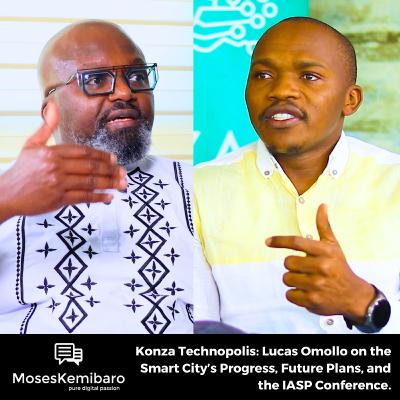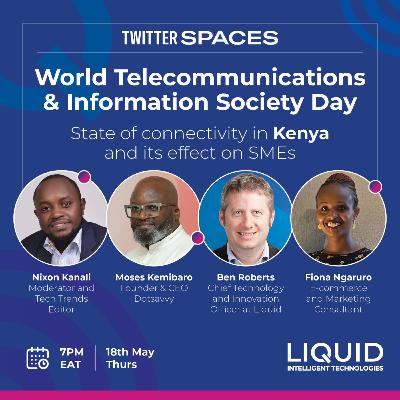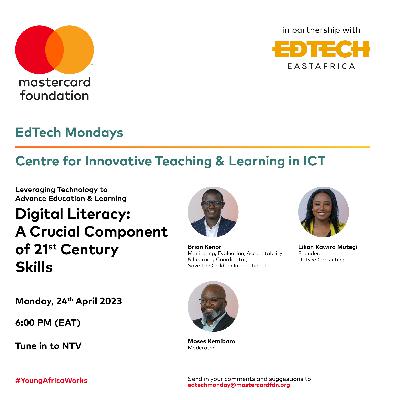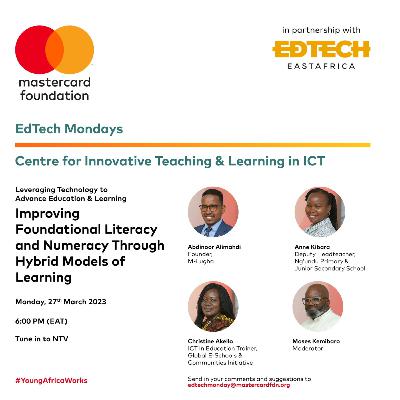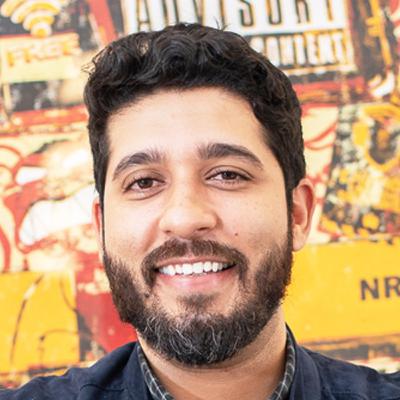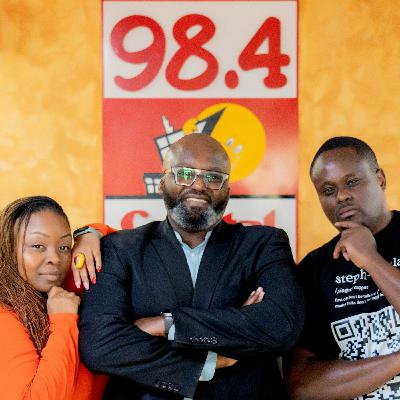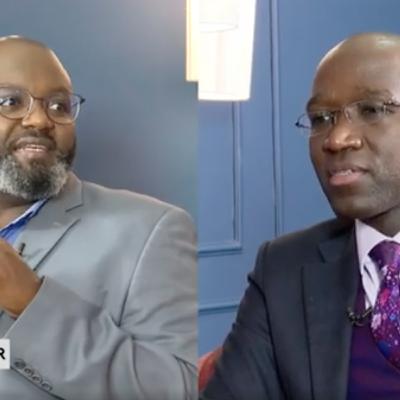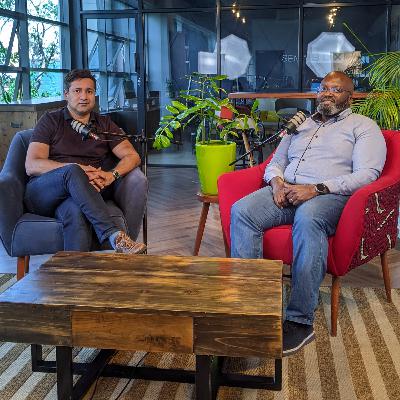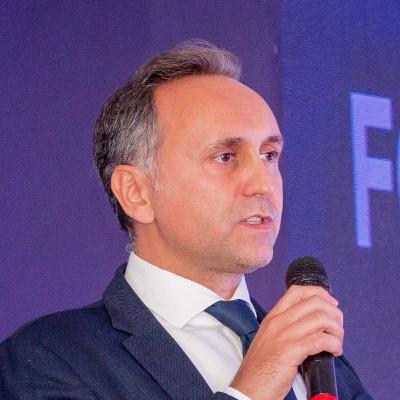Discover Pure Digital Passion with Moses Kemibaro
Pure Digital Passion with Moses Kemibaro

Pure Digital Passion with Moses Kemibaro
Author: Moses Kemibaro
Subscribed: 15Played: 254Subscribe
Share
© Moses Kemibaro
Description
This is pure digital passion, the podcast of Moses Kemibaro, one of Kenya's and Africa's leading digital marketers, techbloggers, and technology analysts. Join me for insightful interviews and commentaries on all things digital from across the African continent on a myriad of compelling topics and themes. I share Africa's stories of pure digital passion!
163 Episodes
Reverse
In this episode of Pure Digital Passion, I spoke with Ranaf Makhani, founder and CEO of RIANA Group, about how his company is transforming customer experience (CX) through innovative technology solutions in Kenya and beyond.
The discussion covers Ranaf’s journey from growing up in Arusha, Tanzania, to founding RIANA Group in 2014. The podcast dives into the company’s key offerings, including queue management, visitor management, and electronic security systems, all designed to enhance customer experience across various sectors.
A key topic of conversation is RIANA Group’s upcoming Customer Experience Executives Forum on October 2nd, 2024. This event will bring together CX leaders to explore how businesses can leverage technology to improve customer satisfaction, retention, and business performance.
Throughout the podcast, Ranaf shares insights into how his company’s tailored solutions have addressed real-world business challenges in sectors such as healthcare, banking, and hospitality. He also reflects on the importance of gathering customer feedback to continuously refine and improve services. Ranaf touches on how COVID-19 accelerated digital transformation and the adoption of AI-driven technologies within RIANA Group’s solutions, making customer experiences more seamless.
Finally, the conversation wraps up with advice for entrepreneurs, focusing on solving real problems and using technology to drive growth.
Key Highlights:
Ranaf’s journey from Tanzania to founding RIANA Group
Key innovations in queue management, visitor management, and electronic security
The role of customer feedback in improving CX
RIANA Group’s approach to personalized, tech-driven solutions
Insights into the upcoming Customer Experience Executives Forum
The impact of COVID-19 on digital transformation in customer experience
Ranaf’s vision for the future of customer experience in Africa
Advice for entrepreneurs looking to break into technology businesses
Don’t miss this deep dive into customer experience technology! Subscribe to Pure Digital Passion for more engaging discussions with technology leaders.
Join us for an insightful discussion with Lucas John Omollo, Chief Manager of ICT & Smart City Solutions at Konza Technopolis, as we explore the remarkable progress Konza has made in becoming a global smart city. 🌍
In this episode of the Pure Digital Passion Podcast, we cover:
Konza’s achievements in ICT and smart city infrastructure
The National Data Center and smart traffic systems
Plans for the Kenyan Advanced Institute of Science and Technology (KAIST)
The future of Kenya’s digital economy and job creation
The role of the creative economy with the upcoming Digital Media City
The 41st IASP World Conference, hosted in Nairobi from September 24th to 27th, 2024
📅 Register for the IASP World Conference: https://www.iaspworldconference.com/register/
✈️ Kenya Airways Special Offer: Get 15% off international flights and 7% off domestic flights with promo code KONZA24. Book via the Kenya Airways website or mobile app: https://www.kenya-airways.com/en/promotions/41st-iasp-world-conference/
On August 14th, 2024, I moderated a panel at the Kenya Internet Summit and .KE Awards 2024 on Innovation and Entrepreneurship Best Practices for Kenya’s and Africa’s Digital Transformation. We had a productive discussion with Joel Karubiu, Njihia Mbugua, and Kenneth Njihia.
Government Process Automation: Lessons from Estonia and Kenya
Joel Karubiu shared insights on Estonia’s success in government automation, particularly its digital ID system, which underpins seamless access to services. This system has made Estonia a leader in e-governance. Joel noted that Kenya has made strides with initiatives like eCitizen but still needs improvements in service delivery.
He emphasized that building trust and better communication are essential for the success of such initiatives. The government needs to focus more on conveying the benefits of systems like the digital ID to the public to build confidence.
The Role of Solution Architects in Digital Transformation
Njihia Mbugua discussed how solution architects are vital in aligning business and technology interests within enterprises. He stressed that innovation should focus on addressing real problems rather than creating solutions in search of problems. Njihia also pointed out that integrating new technologies, such as AI and blockchain, can revolutionize industries like healthcare and agriculture by offering personalized medicine and enhanced food security.
He highlighted the importance of balancing these innovations with existing infrastructure, especially in sectors like banking, which still rely on legacy systems.
Leveraging AI for Business Efficiency
Kenneth Njihia explored how AI is transforming industries, especially in advertising. AI-generated visuals are becoming commonplace, helping companies save time and money. Kenneth also discussed how AI tools like ChatGPT are revolutionizing content creation and data analysis, enabling businesses to operate more efficiently.
While AI offers great potential, Kenneth emphasized that human creativity and local insights remain crucial in creating impactful marketing campaigns. AI’s role in improving customer service through chatbots was also highlighted.
Cybersecurity and Data Privacy in Kenya
Joel revisited cybersecurity, drawing from Estonia’s experience as the first country to be cyber-attacked in 2007. Estonia’s resilience is based on its digital ID system, which serves as a single source of truth for both government and private sector interactions.
He stressed the need for Kenya to prioritize cybersecurity and data privacy, urging individuals to take responsibility for safeguarding their personal information and calling for improved digital literacy to help citizens understand the value of their data.
Ethical Issues and Opportunities in Technology
Kenneth also addressed the ethical challenges in technology, such as the rise of gambling addiction among Kenyan youth. He shared how countries like Sweden use AI and digital IDs to control gambling activities, ensuring that individuals do not overspend. Kenneth called for similar innovations in Kenya to tackle these challenges while promoting the positive uses of technology, such as financial inclusion and online freelancing opportunities.
Conclusion: The Quiet Success of Kenyan Tech Startups
As the discussion wrapped up, I shared my observations on the quiet success of many Kenyan tech startups. Unlike the high-profile startups that often make headlines, companies like PesaPal and Turnkey Africa are quietly excelling in the B2B space by solving real problems and generating profits.
In conclusion, our discussion highlighted that digital transformation in Kenya and Africa is advancing steadily. To fully unlock its potential, we need to foster trust, improve digital literacy, and create an environment where innovation can thrive by solving real-world problems.
This is a Twitter Space that was held on the evening of Thursday the 18th of May 2023 by Liquid Intelligent Technologies in Kenya with the topic 'The State of Connectivity In Kenya & Its Effect On SMEs'. The Twitter Space was hosted and moderated by Nixon Kanali of TechTrends Media and featured a panel comprising Fiona Ngaruro, Ben Roberts of Liquid Intelligent Technologies, and Moses Kemibaro of Dotsavvy. The Twitter Space was centered on the following;
Raise Awareness of the Connectivity Gap in Kenya: Create awareness about the importance of addressing this gap for overall socioeconomic development and how players such as Liquid Intelligent Technologies can help businesses achieve this.
Link Advanced Connectivity to Trade and Economic Growth: Illustrate how advanced connectivity is vital for initiatives like the African Continental Free Trade Area (AfCFTA) and its potential to boost trade across the 54 countries in Africa. Highlight the connection between high connectivity and the growth of SMEs, which are critical for boosting a country's GDP in which Liquid is playing a huge role.
Showcase the Benefits of Advanced Connectivity: Discuss the tangible benefits that advanced connectivity can bring to Kenyan SMEs. Explain how improved connectivity can empower these businesses, enhance their operational efficiency, expand their market reach, and contribute to economic growth.
Highlight the Role of Digital Technology in Transforming Lives: Emphasize how embracing digital technology on a wider scale can bring about significant positive changes in Kenyan communities. Showcase real-life examples and success stories that demonstrate the transformative power of connectivity in areas such as education, healthcare, entrepreneurship, and access to information.
In the March 2023 edition of EdTech Mondays Kenya, we explored foundational literacy and numeracy: a child’s ability to read basic texts, write clearly and solve basic mathematics problems such as addition and subtraction. We explored how technology can be a key enabler for foundational literacy and numeracy and how hybrid models of learning can improve foundational learning outcomes.
Foundational literacy and numeracy are essential skills for people to navigate the world around them. However, in a world that is increasingly digitized – where government services, banking, and many jobs require citizens to use digital tools – traditional literacy and numeracy are not enough. Digital literacy is required for people to successfully and safely exist in a digital society.
The Ministry of Education and the Ministry of ICT and Innovation have both emphasized the importance of digital literacy for learners and citizens and are making large investments to ensure all Kenyans have the knowledge and skills to be able to navigate this new digital world.
Since 2015 the Digital Literacy Programme, the government’s flagship e-learning initiative, has aimed to increase the digital literacy of learners through ICT integration in public schools. Additionally, digital literacy is one of the Competency-based Curriculum’s seven core competencies - signaling its importance to success in both learning and life.
In the April 2023 edition of EdTech Mondays Kenya, we went deeper into understanding how digital literacy is a crucial component of 21st-century skills for learners of all ages. The panel for the session was as follows:
Brian Kenor: Monitoring Evaluation Accountability and Learning (MEAL) Coordinator, Save The Children International
Lilian Kawira Mutegi: Founder, Uptyke Consulting
Moses Kemibaro: Session Moderator
In the February 2023 edition of EdTech Monday Kenya we explored the topic on the mainstreaming of hybrid models of learning as a means of ensuring that all learners in Kenya can be accommodated in a learning environment that can be in-person or virtual. In hybrid learning, educators can teach remote and in-person students at the same time using tools like video conferencing to make this viable and sustainable. Hybrid learning is increasingly being seen as a way of ensuring that all learners can be accommodated in a learning environment that can be in-person or virtual.
During last month’s episode, we established that hybrid models of learning in Kenya can give learners an opportunity to better understand educational content outside the traditional classroom experience and also offer a way of learning that does not require them always be in a classroom. In addition, it also allows parents and caregivers of young learners to play a more engaged role in their education leading to better participation and understanding. We also learned from last month’s episode that educators need to be trained and equipped to deliver hybrid learning models effectively and efficiently whilst adopting new teaching techniques and educational technologies.
In the March 2023 edition, we will look to go further in understanding how hybrid learning models can be used to improve foundational literacy and numeracy among young learners in Kenya. Foundation literacy and numeracy are broadly defined as a child’s ability to read basic texts and solve basic mathematics problems such as addition and subtraction. It also enables children to become independent and engaged readers and writers who can transition from 'learning to read' to 'reading to learn' and from 'learning to write ' to 'writing for academic success and pleasure'.
In Kenya, when it comes to foundational literacy and numeracy, a learning assessment by a non-governmental organization called Uwezo in 2021 showed that 60 percent of grade four learners could not read a grade three appropriate text. In 2014 one out of every 10 Kenyan children completed primary school without having fully mastered class two skills, the report showed. These basic skills are necessary for children to understand and engage with the material they are taught in school and to acquire technical and higher-order skills as they progress in their studies. Lost learning that takes root in the earliest years of children’s lives fails to narrow in the following years.
Hybrid learning models can help close the gaps for young learners in Kenya, where foundational literacy and numeracy is concerned. Moreover, the need for foundational literacy and numeracy skills has acquired greater prominence in our increasingly complex and rapidly changing digital-first world, where individuals continuously need to expand their knowledge and learn new skills to keep up with the pace of change. Our conversation will explore how the uptake of technology-driven education or EdTech in the form of hybrid models of learning can increase the quality of education at foundational levels for literacy and numeracy. Our panelists for the session were:
Christine Akello - ICT in Education trainer, Global E Schools and Communities Initiative
Abdinoor Alimahdi - Founder, M-Lugha
Anne Kibara - Teacher, Ng’undu Primary and Junior Secondary School
Session Moderator - Moses Kemibaro
This is a conversation I had with Sajid Vayani who is the Sales Director of iColo at the telco-centric East Africa Com 2023 Conference that was held in Nairobi this week at the Radisson Blu Hotel in Upper Hill. Sajid has an interesting background in that he originally started his career in accounting and at some point managed to pursue his passion for acting by attending a Master's Degree Program in the UK.
He then came back to Kenya and was recruited as a Management Trainee at iColo 7 years ago as Kenya's first carrier-neutral data center business. Sajid then rose through the ranks to eventually occupy his current role as the Sale Director of iColo which currently has multiple data centers in Kenya and Mozambique as of this writing.
iColo is the leading carrier-neutral data center provider operating state-of-the-art facilities in Kenya and Mozambique serving clients such as telecom carriers, Internet Service Providers (ISPs) and peering points, IT & cloud service providers, content providers, enterprise and financial services providers. iColo is owned by Digital Realty which has a global data center community of 300+ facilities across 28 countries on 6 continents.
In our conversation, Sajid shared many insightful perspectives on what sets iColo apart in an increasingly competitive market in Kenya for data centers that have become increasingly important due to the accelerated digital transformation that the COVID-19 pandemic precipitated for organizations of all sizes. Have a listen!
Hybrid learning Involves the combination of in-person learning and remote learning and is not necessarily taught in a traditional classroom. It is increasingly being seen as a way of ensuring that all learners can be accommodated in a learning environment that can be in-person or virtual.
Almost 1.13 million children of primary school age (6 to 13 years old) were out of school in Kenya, according to an Out-of-School Children Initiative study conducted in Kenya in 2020. The situation was worsened due to the impact of COVID-19 related school closures, followed by drought in many of the focus counties. As a result, the pandemic became a key catalyst in the adoption of hybrid learning in Kenya. This transition was largely enabled by the proliferation of affordable and capable smartphones as well as other consumer electronics such as radios and televisions to receive educational programming.
EdTech has proven it can make hybrid learning more accessible and inclusive for learners at all levels in Kenya but at the same time its adoption and sustenance require a myriad of factors to be aligned in a way that makes it practical and successful. Key considerations such as access to technology infrastructure and human resources are some of the aspects that play a key role in the enablement of hybrid learning at scale.
Going forward, what are some of the key considerations for educational systems in Kenya to ensure that hybrid learning can be adopted more effectively and ensure its resilience and longevity for learners across all spectrums, geographies, and socioeconomic statuses in the country? What are some of the barriers to making this possible and at the same time what are the key enablers that can ensure its viability in the long term? What sort of fundamental changes need to be made to make hybrid learning accessible to learners in Kenya at scale?
In this conversation, we explored the challenges and opportunities of hybrid learning for learners in Kenya, and what this means for today and in the future. Our panelists were Wanjiku Gathoni, Regional Manager of Impact and Evaluation at Worldreader, Danielle Ochieng’, Education & Research Consultant at Ubongo, and James Kamau Gitiro, HP Idea Fellow, Microsoft Innovative Educator Expert and Teacher at Manyatta Primary School in Laikipia County.
In case you missed it, this is a radio interview I had with 98.4 Capital FM's June Gachui and Martin Kariuki on their show, The Jam, this past week on Wednesday the 9th of February 2023. The conversation we had was quite different from what I expected in that we went a lot deeper, and, wider on the topics we covered.
For me, in some respects, it was probably the first time I shared some personal details about myself in the media like the early days of my entrepreneurship journey at Dotsavvy, the ups and downs of being an entrepreneur for over two decades, my love of Arsenal football club, as well as the way afrobeats music seems to have become an obsession from me after doing lots of trips to West Africa in the past and eating far too much jollof rice!
Chief Nyamweya is an Illustrator, Content Creator, and Writer who I have known for the better part of a decade since the early days of Nairobi's iHub where we used to regularly attend events. I lost touch with Chief for a fair bit of time until sometime during the COVID-19 pandemic when through pure blind luck he and I met as part of a series of interviews for a documentary on the past, present, and future of Kenya's digital ecosystem. That particular documentary never got produced or aired as we expected but as events would have it our paths crossed recently when he was busy creating some media visibility for his latest creative endeavor in late 2022, known simply as Trust.
Trust is a graphic novel, motion graphic, and NFT collection that follows a storyline that reimagines Kenya. As far as I know, Trust is probably the most innovative creative initiative that I am aware of that even includes an NFT from a Kenyan perspective making it very much in line with the world's fast-growing but quite nascent Web3 paradigm. Trust is available in hard copy to purchase online or offline, is available online as an interactive motion graphic, and as an NFT collection that you can purchase using crypto like Ethereum.
In our conversation, Chief shared his life journey to date as someone who loved to doodle as a youngster, pursued education and a career as a lawyer and a chartered accountant before returning to his first love of creative art and design - talk about making a pivot. He also pursued his current vocation by getting a degree in the US as well as setting up a creative agency, Freehand Studios, that would explore African-themed stories and concepts from a localized perspective, delivered across digital and traditional mediums. Ultimately, all these twists and turns led him and his collaborators, Anne Connelly and Sarah Mallia, to create Trust.
Trust is set in an alternative African nation to tell the story of Moraa who is a young activist who together with the Sankofa collective use the power of blockchain technology to protect their community from cultural and ecological destruction. Trust uses the power of storytelling to explore themes of corruption, cultural & ecological preservation, historical injustices, communal trust, and land ownership. Trust is groundbreaking in the subject matter it covers as well as the source material which will be very familiar to most Kenyans albeit very revisionist in its execution. You can find out more about Trust at https://www.trustgraphicnovel.com/
The International Day of Persons with Disabilities was the 3rd of December 2022 which aims to promote an understanding of disability issues and mobilize support for the dignity, rights, and well-being of persons with disabilities. Last year’s theme was “transformative solutions for inclusive development: the role of innovation in fuelling an accessible and equitable world”.
Challenges for learners with visual impairments in Kenya include poor communication, poverty, long distances to school, lacking basic education resources like teachers, and low literacy rates within communities. On a positive note, Kenya has a policy in place that aims to make education accessible and inclusive by providing space, resources, and training for teachers in schools so that learners with and without visual impairments can learn alongside each other, enabled by EdTech solutions.
In November 2022, I once again moderated EdTech Monday Kenya where our panel discussion topic was 'Edtech as an Enabler of Education for Learners with Visual Impairments In Kenya'. Our panel consisted of Sheilah Lutta, Principal Education Officer - Special Needs Education, Ministry of Education. Suparna Biswas, CEO, Kilimanjaro Blind Trust Africa. Eric Ngodi, Board Member, United Disabled Persons of Kenya (UDPK) and Secretary - Society of Professionals with Visual Disabilities (SOPVID). Rose Omollo was our sign language Interpreter.
I found this particular Edtech Monday Kenya to be truly eye-opening as I got to visit Moi Girls High School in Nairobi where they have a team, facilities, and equipment to accommodate school girls with visual impairments. I met some of those involved including teachers, students, and other support staff, and got to interview them to better understand the realities on the ground as well as the challenges and opportunities that exist. EdTech for learners with visual impairments is clearly transformative!
This a conversation I had with KTN's Laban Cliff on The Headhunter TV Show in November 2022 where we discussed a broad range of topics around the digital future of work in Kenya and beyond. We talked about my own experiences as the CEO of Dotsavvy in terms of how we had to adapt and change as an organization in how we work due to the COViD-19 pandemic almost 3 years ago when we started working remotely on a full-time basis. We also discussed what changes we had to make in terms of managing our business across the board with a specific focus on recruitment as well as our day-to-day operational aspects as far as our team is concerned including the various productivity platforms and business processes.
Another key aspect of our conversation revolved around the importance of individuals building strong personal digital brands on social media as one of the ways that they can ensure they stand out from the crowd via thought leadership content that can position them as desirable employee candidates for work-related opportunities. This is an area that has become especially important since the onset of the pandemic as everything went digital as far as talent recruitment is concerned for employers of all sizes in Kenya and beyond.
Lastly, we also discussed how important it has become for organizations to become more flexible with their workforce by adopting hybrid and work-from-home policies that are focussed on productivity and not just showing up in person at the office at a time when talent wars have become intense in Kenya! Due to this trend, we talked about how the best talent in Kenya is now being recruited globally with highly competitive packages whilst allowing them to work anywhere they prefer globally. This paradigm shift is changing everything about the current and future workplace practices from a recruitment and human resources management perspective.
Sendy as a business has gone through many pivots since it launched a few years ago in Kenya when it initially focussed on providing last-mile e-commerce logistics and fulfillment services for a diverse range of customers, small and large alike. Since then, Sendy business model has evolved to focus primarily on business-to-business or B2B logistics and fulfillment that includes large manufacturers and distributors who don't even do e-commerce at this time.
In my conversation with Sendy's CEO Meshack Alloys, we got to talk at length about the evolution of their business model to go where they are today with a presence in various markets in East and West Africa. Sendy has also been able to grow its digital-first logistics and fulfillment capabilities by building and managing its own proprietary technology platform that has become a cornerstone of its competitive advantage in the markets where they operate against much larger and better-established logistics businesses.
In many ways, from what Meshack shared in our conversation, technology sits at the heart of what makes Sendy a unique and successful digital logistics and fulfillment business. This DNA underpins the ambitious plans that Sendy has as a business going forward to acquire more customers over time whilst building out even more capabilities on the ground such as warehousing and fulfillment centres as well as signing up more delivery partners for their offerings. Sendy is definitely looking to scale up and become a major logistics business across Africa.
Akshay Gover is the CEO of Cellulant, arguably one of Africa's largest and oldest fintechs that is focused on providing a myriad of integrated digital payment services in Africa and beyond. Akshay joined Celluant approximately two years ago at the height of the COVID-19 pandemic during which time the business was undergoing a significant leadership transition with the founders exiting day-to-day management.
Cellulant has a formidable geographical and digital payments footprint across Africa in the many countries where it operates where it connects consumers, businesses, and other stakeholders across its various offerings. During our conversation, Akshay was able to articulate very succinctly where Cellulant has come from, where it is today and where it is going.
It's quite evident that Cellulant has built an impressive Pan-African digital payments ecosystem that enables businesses of all sizes to acquire and make digital payments at scale in Africa and beyond. Cellulant is connected to a good number of banks, telcos, and digital payment partners like Mastercard which makes them uniquely positioned to be the glue that connects everyone to everything from a payments perspective. This has taken a long time to achieve and our conversation really delves into all the details of what makes Cellulant such a successful fintech in Africa.
This is a conversation I had a little while ago with Oladosu Teyibo who is the Founder and CEO of Analog Teams, a global technology services outsourcing business that's based in the US but utilizes the best African talent to deliver high-quality services to some of the world's largest businesses. Teyibo is Nigerian and attended University in the US where he also happened to be a successful track and field athlete. During his time at University, he also ended up meeting Yao Adantor who is also a co-founder at Analogue Teams where they jointly embarked on the entrepreneurship journey to create what would eventually become Analog Teams today after several key pivots on their business model.
Teyibo graduated from university and initially started his working career as a software engineer at General Dynamics before transitioning to become a business analyst as he wanted to understand how his clients' businesses actually worked. During his time at General Dynamics, he also met Myesha Luster who also eventually became a co-founder of Analog Teams. After he left General Dynamics he started a high-end computers customization business that pivoted into a car dealership services business as well as a haircare business. This set the stage to create Analog Teams and led him to live in Kenya for a year to better understand how the Safaricom M-Pesa mobile money ecosystem worked as they saw an opportunity to tap into this space from an entrepreneurial perspective. e then moved to Nigeria and this led to an epiphany that there was great and hungry talent in Africa for technology services to deliver solutions to global businesses.
Since its last pivot, Analog Teams has grown massively and has outsourced talent across the African continent in markets like Kenya, Nigeria, South Africa, and others. At the core, what makes Analog Teams unique is that they work to the highest standards and are globally competitive in their offerings. The culture is very much based on being accountable for outcomes and ensuring that there is an aspect of being there for all the team members and their well-being.
Analog Teams is also keen to ensure that their teams can do great purposeful work and can also be proud of what they are doing there for their clients. Indeed, according to Oladosu their recruitment process is highly rigorous to ensure that they not only hire for competence but also for the right attitude given the ambition that they have for Analog Teams. In the last six 6 years or so Analog Teams has managed to hire and train 100+ team members and have skilled them up so that they are much more capable from they joined even if they eventually move on to other opportunities.
However, what fascinates me the most is that Analog Teams has a business model that leverages a local presence in key international client markets whilst adopting global best practices and outsourcing business processes using African-based technology talent. Other global businesses are doing similar things from a technology services outsourcing perspective that leverage talent in or from Africa but Analog Teams is founded and managed by a team from Africa which makes them somewhat unique. Analog Teams also grew substantially during the pandemic and they have big plans going forward to grow their business to focus on outsourcing recruitment for technology talent for clients as potentially yet another pivot of sorts. Have a listen and I hope you enjoy our conversation!
This is a conversation I had with Ted Pantone who is the founder of an innovative and potentially disruptive insurtech startup called Turaco. Ted has worked for many years in Kenya and Uganda and at one point he was the founder of the Ugandan Franchise of Pizza Hut as well as running development projects in water and sanitation in Western Kenya for the Gates Foundation.
Ted has a passion for looking for solutions to big problems in Africa given the various work experiences he has had on the continent. This is what led him to realize that there was a big gap in Africa with regard to access to Insurance for the mass market. This is a really big problem that means that many people and families suffer incredibly difficult circumstances due to not having a myriad of insurance services when they need them the most.
Turaco offers a novel approach to the insurance problem in markets like Kenya and Uganda as well as Nigeria in the near future by providing affordable and accessible insurance that can be delivered via mobile channels. Turaco targets underserved customers and low-income earners by embedding its service as a white-labeled offering that is bundled with a partner’s core product or service while integrating with their existing payment processes to collect premiums. Turaco acts as a distributor, broker, and interface between the insurance underwriter and customers.
Turaco has a robust API integration that offers easy collaboration with its external partners, enabling business partners to integrate insurance into their products and services efficiently and at no additional risk or cost. An example of this approach is how Turaco is doing so with a mobile network in Kenya designed to work on even the most basic of feature phones using technologies like USSD so that basic mobile access is indeed the common denominator.
Turaco recently raised a US$ 10M Series A equity round led by AfricInvest, via the Cathay Africinvest Innovation Fund, and existing investor, Novastar Ventures. This funding will enable Turaco to expand its geographical footprint and deepen its insurance service offerings across the African continent into populous markets like Nigeria where it can potentially onboard millions of new customers for its offerings via strategic business partnerships. Some of the key customer segments that Turaco serves in Kenya and Uganda for instance are Sun King, One Acre Fund, Tugende, and M-KOPA.
One of the key things I learned is that Ted hopes that Turaco can onboard as many as a billion customers onto its platform! At the same time, Turaco's insurance claims processing takes only a matter of minutes given that its largely a technology-driven process. Turaco can be disruptive in that many low-income earners in Africa could become insured for the very first time at scale in a way that has never been done before. This could be a mobile money moment in the same way that Safaricom's wildly successful M-Pesa transformed financial inclusion for consumers in Kenya and Tanzania. Have a listen and I hope you enjoy our conversation.
This is a conversation I had with Jaime Pinto who was recently promoted to the position of Chief Commercial Officer of the Software Group. Jaime is an interesting person who has worked in technology-related businesses for decades across many regions and markets both as an entrepreneur and as a senior corporate leader. He has a rich professional background in digital payments and financial solutions as well as mobile banking and mobile money in Africa, Asia, and Europe. Jaime also happens to be a polyglot and is fluent in English, French, Portuguese, Spanish, and Italian! Jaime is remarkably well-traveled in Asia and Africa meaning he can truly appreciate the nuances of delivering digital payments and financial services for those at the bottom of the pyramid for his clients.
The Software Group as a business works closely with banks, co-operatives, fintech, and all sorts of businesses in the financial services space to help them achieve digital transformation. As I spoke to Jaime in detail during our conversation, it occurred to me that the Software Group essentially operates as a financial services technology ecosystem that connects a myriad of financial platforms and interfaces that enable their customers and partners to deliver services at scale in a truly inclusive manner - including even working with their competitors!
As a result, the Software Group has made inroads globally but in particular in markets like Africa where mobile is key in the delivery of digital banking, financial services, and Insurance (BFSI). Indeed, the Software Group has enjoyed global recognition for the solutions it has deployed in more than 70 countries from 9 regional offices serving customers like the Gates Foundation, MasterCard & MasterCard Foundation, International Finance Corporation (IFC), Fidelity Bank in Nigeria, Commercial International Bank Egypt as well as the KCB Bank Group in East Africa.
In Kenya and East Africa, the Software Group has worked with some of the largest and smallest players in the financial services space enabling agency banking for the masses as well as mobile banking and insurance channels. Jaime in particular has been instrumental in ensuring that the Software Group is able to meet customers' needs for unique financial services technology offerings that work well in Africa given our unique and sometimes challenging market conditions and consumer realities. Software Group is driving the financial services inclusion agenda in Kenya and Africa in a way that works and leverages the best of digital transformation for its customers. Have a listen and I hope you enjoy our conversation!
Safaricom, Kenya's leading mobile network officially launched its commercial 5G services in Kenya during an event on Thursday the 29th of October 2022. As part of the launch, Safaricom had a panel of Moses Kemibaro the Founder and CEO of Digital Agency Dotsavvy, Rehema Wachira a Full Stack Application Developer from Andela, and Brian “Beast” Diang'a a leading Professional E-Sports Athlete in Kenya moderated by Technology Thought Leader and Entrepreneur Mbugua Njihia.
During the panel, we got to discuss different perspectives on what we saw as some of the key benefits that Safaricom's 5G will bring to our professional areas of work and expertise. At the same time, we got to learn and understand many of the possibilities going forward for 5G in Kenya that could have significant positive implications for the market at large. Have a listen and I hope you enjoy the panel discussion.
The International Day of the Girl Child was 11th October 2022 which recognizes girls' rights, and the unique challenges girls face around the world. This year’s theme is “Digital generation. Our generation”, which provides a platform for the global community to understand the disadvantages girls face online. This is very much in line with our theme for the October 2022 Edtech Monday Kenya which is “Advancing Girls’ Education Through Digital Learning in Kenya”.
In terms of advancing girls’ education through digital learning, the advent of the pandemic brought to the fore technologies, platforms, and processes that can enable education for out-of-school girls at scale throughout Kenya. Technologies like mobile devices and the Internet have become key delivery channels for digital learning for out-of-school girls of all ages in the country. Digital learning can counter the barriers that prevent out-of-school girls from accessing education, including long distances to schools, the high cost of education, sexual and gender-based violence, exclusionary policies, unequal burdens like household work, and a negative bias on the value of educating girls.
In today’s conversation, we will explore the ways and means that digital learning can be a key enabler of education for out of school Girls in Kenya, as well as the challenges that exist in making this widely and easily available. Our EdTech Monday Kenya panel for October 2022 of Rukia Sebit, Founder, Sunflower Trust, Tonee Ndungu, Founder & CEO, Kytabu, Margaret Kamau, Deputy Project Director - GEC Project, Education Development Trust, and myself Moses Kemibaro as Moderator had a conversation on advancing out of School Girls’ education through digital learning.
BasiGo is one of Kenya's first companies that has delved into the public transport sector by offering a novel electric bus proposition that will enable public service vehicle or PSV operators to finance the purchase of the electric buses affordably and cost-effectively from the KCB Bank Group. The electric vehicle or electric mobility space in Kenya is quite nascent and hence this is definitely quite unique!
The whole financing approach is genuinely disruptive in that purchasing an electric bus for public transport operators in Kenya with affordable and sustainable for all stakeholders with the KCB Bank Group offering up to 90% financing over a 36-month period. Indeed as of this writing, BasiGo is offering its 25-seater electric bus for Kes. 5M and already has a backlog of over 100 orders in place.
BasiGo offers a Pay-As-You-Drive subscription at a price of Kes. 20.00 per kilometer driven and they retain ownership of the batteries in the electric bus. The subscription includes service and maintenance, insurance, recharging, and the leasing of the batteries as well! The K6 electric bus that BasiGo is bringing to the market is also state-of-the-art in that it has Internet service built into it, it's very quiet and comfortable, has security cameras on board, and also requires driver training to ensure optimum utilization.
I had the opportunity to meet BasiGo's CEO Jitt Battacharya and KCB Bank Group's Head of Asset Finance Robert Mburu for a conversation on all aspects of their strategic financing partnership for BasiGo's electric buses in Kenya. We also got to understand how BasiGo has been running an extensive pilot in Nairobi with two of its electric buses at Citi Hoppa and East Shuttle since March 2022 and over 90,000 kilometers were covered and 112,000 passengers carried. In addition, they have avoided over 17,000 liters of diesel fuel consumption and mitigated 42 tonnes of carbon emissions as well as having 98% uptime with daily usage.
At the same time, we learned how KCB Bank Group is part of the Green Climate Fund or GCF which is part of its major push into sustainability as a bank and how this is aligned well with BasiGo's electric bus proposition in Kenya. It took only 3 months for BasiGo and KCB Bank Group to enter into their financing partnership which is impressive given that BasiGo is an electric mobility startup! Have a listen to learn more about BasiGo's and KCB Bank Group's innovative financing partnership to supply electric buses for Kenya's public transport sector!



